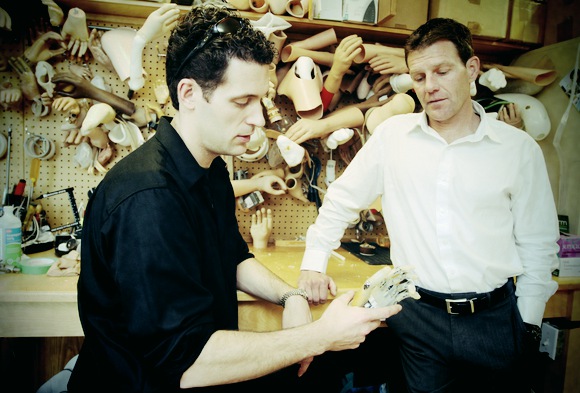- May 31, 2013
- Applied Research
- Comments : 0
Seven NB Researchers Awarded $500,000 – Daily Gleaner

By Laverne Stewart, The Daily Gleaner | link to original article (subscribers only)
The New Brunswick Innovation Foundation has awarded $500,000 to seven university researchers to hire research technicians.
Five of the seven funding awards go to researchers at the University of New Brunswick. One of the recipients is Kevin Engelhart with the university’s biomedical engineering institute. The institute is considered a world leader in research and development of artificial limbs.
Engelhart said their research involves advanced prosthetics systems that he expects will be available for use in the next few years.
Engelhart is receiving $70,000 to hire research technician Erik Scheme, who’s just received his doctorate in biomedical engineering. Engelhart said Scheme is a world leader in the field.
Scheme has been hired to create artificially intelligent prosthetic arms that have pattern recognition control.
“We’ve managed to make a lot of headway on this research, and this (the funding to hire him) will give us an opportunity to continue it. We want to push it so that it can be tested in clinics by patients so they can then take it home and use it,” Scheme said.
The prototype prosthetic arms will learn an individual’s subtle behaviours and decode their muscle activity, Engelhart said.
“Essentially what it allows them to do is control an artificial limb with much more dexterity than ever before,” Engelhart said.
These prosthetic arms will have hands and wrists that will move and bend, allowing them to do everything from picking up a cup of coffee to opening a door with just a thought from the person using the prosthetic limb.
Scheme and Engelhart want people to control the movements of their artificial arms, wrists and hands with ease. Specific tasks, such as picking up a set of keys, come with significant engineering challenges to make it possible to do so effortlessly, Engelhart said.
These prosthetic limbs, he said, will help amputees do things more easily because they’re going to be able to grasp objects more naturally.
“Now we’re having amputees try this. To see the look on their faces, knowing that this is will soon be possible, is very motivating,” Engelhart said.
It’s Scheme’s job to take all of the research that he and others have done and configure it into something that can be used by amputees in the next several years.
“He will be refining this technology so that it works in real-world situations. He’s the one taking the technology to the point where people can actually use this, and it will work reliably for amputees when they get these new devices,” Engelhart said. Robert Hatheway, chairman of the New Brunswick Innovation Foundation, said the research technician funding is an investment in what will become commercial products in the near future.
“Kevin (Engelhart) and all of the other researchers are perfect examples of being at the top of their game,” Hatheway said.
He said the New Brunswick Innovation Foundation works with universities and researchers to increase their ability to hire the researchers needed to continue to advance whatever projects they’re working on.
He said he believes the Research Technician Initiative Funding has been one of the most important aspects of what the foundation does in conjunction with the Department of Post-Secondary Education, Training and Labour.
Hatheway said all seven of the research organizations receiving the technician initiative funding are innovative by nature and, when they’re on the verge of a breakthrough with commercial potential, additional research talent is needed to help speed up the process.
He said the research technician funding helps to fast-track the research into real-world applications and commercial products.
Danny Soucy, minister of the Department of Post-Secondary Education, Training and Labour, said the government is pleased to support the funding initiative.
“Helping to grow the New Brunswick economy through innovation starts with education and learning, and when instructors have the resources to do leading-edge research, what they learn finds its way into their classrooms and labs and impacts the way students look at economic opportunities,” Soucy said.
The $500,000 awarded was matched by each research organization. The funding covers half of the salary and benefits of seven new research technicians for three years.
Since 2003 the New Brunswick Innovation Foundation and the Department of Post Secondary Education, Training and Labour have awarded $4.5 million to create 67 new positions under the Research Technician Initiative, unlocking $21 million more from recipient institutions, national granting councils and industry.
“Stay turned. There will be lots more coming in the coming weeks and months,” Hatheway said.

